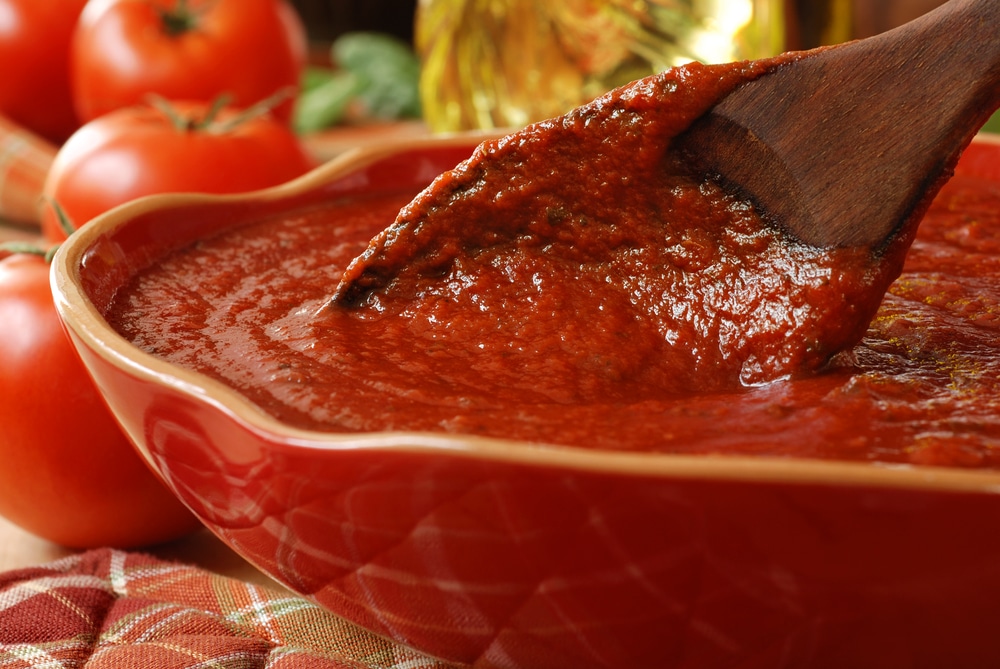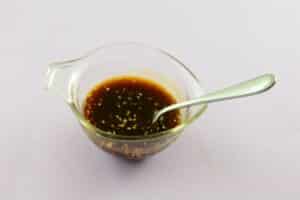You’re making a homemade pizza in the comfort of your kitchen. You’ve kneaded, shaped the dough, grated the mozzarella cheese, and diced up the veggies and meat. Your stomach is rumbling, and your mouth is watering for some delicious, cheesy tomato goodness as you smell the ingredients.
Now that all the ingredients are prepared, you’re ready to add the sauce. You open the fridge and pull out some pizza sauce to slather on your crust. You think to yourself: how long does pizza sauce last in the fridge? You’re not sure how long it’s been in there, but it can’t be that bad, right?
You take a quick whiff, and it doesn’t smell bad, so you assume it’s all good. Then, you pop your pie in the oven for several minutes.
The timer goes off, and you pull your steaming beauty from the oven. You can’t wait to dive in.
You pick up a piece, take a bite, and oh no. Your pizza is disgusting. What happened? Where did you go wrong? Then, it dawns on you. The sauce was probably expired. Now, your beautiful pizza is ruined.
We’re here to make sure this doesn’t happen. Keep reading to find out the answer to your question: how long is pizza sauce good for in the fridge?

How Long Does Pizza Sauce Last in the Fridge ?
How long does pizza sauce last in the fridge? The answer is: it depends on the temperature it’s stored at and what type of base it has. Pizza sauces generally last between five to seven days if kept between 35 and 40°F.
Sauces with a tomato base can last a bit longer, lasting approximately five days in the fridge after opening. On the other hand, cheese-based sauces consist of dairy products, which tend to expire quicker. These sauces can last up to three days in the fridge upon opening.
Related: Difference Between Marinara vs Pizza Sauce
Other Alternative Methods of Preserving Pizza Sauce
The best way to preserve your pizza sauce is to freeze it. Doing so can make your sauce last for up to three months. You can freeze leftover sauce or a huge batch of sauce you created yourself. And once you learn how to do this properly, you won’t want to return to your old sauce-wasting ways.
How to Freeze Pizza Sauce
- Cook your sauce like you usually would.
- Let your sauce cool completely.
- Grab an air-tight container, freezer bag, or mason jar.
- Pour the cooled sauce into your container of choice, leaving about an inch of space at the top (the sauce will start to expand as it freezes).
- Put your sauce container or bag into the freezer, and you’re all set!
Once you’re ready to thaw your sauce, simply put your container in the fridge and let it sit in there overnight. The sauce should be thawed by the morning. A quicker defrosting method is to place the container into another larger bowl filled with warm water.
Related: Marinara Sauce vs Tomato Sauce Comparison
How to Tell if Pizza Sauce is Bad
It’s essential not only for you and for others around you that you know when to throw your pizza sauce away. Sometimes it can be challenging to know when it’s good and when it’s gone bad. But with a few simple tests and examinations, you’ll be able to figure out what you should do.
Examine the Best By Date
The first thing you should do is grab your jar and look for the Best By date. This will tell you how long your sauce will be good until you need to pitch it. However, the most important thing to note is that this date indicates how long your sauce will last unopened. Once your sauce jar is open, the expiration process accelerates, making your sauce last up to several days instead of months.
Inspect the Jar
You should always check sauce jars or cans before buying them to make sure that they are in good condition. And when you get home, you should look at the jar again before conducting a smell or taste test. If a can or jar is dented, bloated-looking, the seal is broken, or foam seeps out when you open it, you should not use the sauce.
Check for Mold
Open up the jar and look around. Do you see any green, white, or black mold spots either on the sauce lid or in the sauce itself? If so, you should immediately throw away the sauce jar. Consuming the sauce could make you and whoever eats it with you sick. Even if there’s no sign of mold in the sauce and you wipe away the mold on the lid, the sauce is still not safe to eat. When in doubt, just throw it out.
Smell and Taste Test the Sauce
Our noses can detect when something’s off. If you take a quick sniff and smell a sour odor, it probably means your sauce is past its prime. You can also taste test your sauce to see if you notice any sour or rancid flavors. Do not taste this if you see mold on the sauce lid or in the sauce. It could be dangerous if eaten.
See Also: Tomato Sauce vs Paste Differences
Conclusion
Pizza sauce is one ingredient you can’t mess up. If you do, it can destroy your whole pizza. After all, you can’t just pick it off like you would onions or olives. The sauce touches every part of the pizza, and if it’s bad, that means everything else will probably taste bad too.
It doesn’t matter how good the pasta would’ve tasted, whether sweet and savory or hot and spicy. Good pizza sauce can definitely go bad and quicker than you may think. Make sure to check those expiration dates and mark them when you open the can. This way, you’ll save your taste buds and your stomach some trouble later on.
The next time you or someone you’re with is making a pizza and asks how long does pizza sauce last in the fridge, you can be the one who saves the day (and the pizza).






